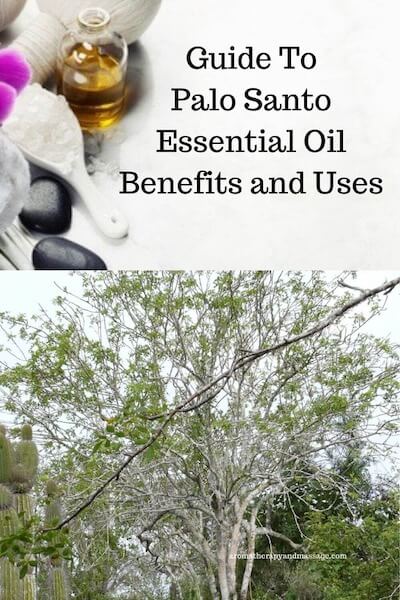- Home
- Essential Oil Profiles
- Palo Santo Essential Oil
As an affiliate for Bookshop, Amazon, and other programs, I may earn a small commission for products purchased through links. This doesn't affect the price you pay. Privacy policy and disclosures.
Search this site:
Guide to Palo Santo Essential Oil Benefits and Uses
Palo santo essential oil (Bursera graveolens) comes from same plant family as frankincense. However, the palo santo (also called holy wood or sacred wood) tree grows primarily in South America, while the frankincense tree grows in Africa. Bursera graveolens has many of the same spiritual and meditative properties as frankincense.

Basic Palo Santo Facts
Plant family: Burseraceae
Production: Steam distilled from the wood of palo santo trees that died naturally. You might read the tree is endangered. However, in 2019 the International Union for Conservation of Nature (IUCN) listed the Bursera graveolens tree as "of least concern." Confusion arises because a different species, bulnesia sarmientoi, is also commonly called palo santo and is a threatened tree.
Aroma: Woody, sweet, slightly fruity.
Perfume/Aromatic note: Middle
Is palo santo safe to use during pregnancy? Most of my sources didn't address this question. A couple did suggest avoiding the oil during pregnancy. Consult a professional.
Is palo santo essential oil safe for children? One source suggested not using the oil with babies less than 2 months of age, while another source said not of use the oil under 6 months of age. Otherwise, the oil, properly diluted, is likely safe for children.
Cautions: If the oil becomes oxidized, it may cause skin sensitization.
Main components:
- (+)-limonene 58.6–63.3%
- (+)-menthofuran 6.6–11.8%
- alpha-terpineol 7.1–10.9%
Source: Essential Oil Safety, 2nd Edition
Palo Santo Aromatherapy Benefits
The Heart of Aromatherapy: Uses for palo santo essential oil include daily skin care, rejuvenating damaged skin, soothing skin irritation, supporting the respiratory system, soothing allergies and sinus congestion, calming inflammation, repelling insects, making natural perfumes, meditating and contemplating, and feeling centered and focused.
The Complete Aromatherapy and Essential Oils Handbook for Everyday Wellness: Use palo santo in blends for joint pain and in massage and inhaler blends to help relieve stress, anxiety, and nervousness and to improve concentration.
The Aromatherapy Encyclopedia: Palo santo is warming, promotes better circulation, and may open the sinuses, deepen breathing, and ease congestion. This essential oil is calming and relaxing, relieves stress, promotes inner peace, and helps with sleep. The oil is also uplifting and improves mental acuity.
Essential Oils for Emotional Well-Being: This essential oil is useful for relieving melancholy and agitation.
Working With Unusual Oils: "Palo santo is a cleansing spiritual wash to renew and bring peace." Suggested essential oils to blend with palo santo:
- To help relieve pain and inflammation: Fragonia, german chamomile, lavender, or plai.
- For meditation: frankincense, nagarmotha, or sandalwood.
The Essential Guide to Aromatherapy and Vibrational Healing: Spiritually, palo santo is beneficial during shamanic journeywork, can clear bad or negative energy, and can deflect psychic attack. Mentally, this essential oil helps you return to center when you are out of balance. This oil helps you focus and set aside fears and distractions and also clears negative mental energy caused by negative self-talk, confusing mental chatter, and jealousy. Emotionally, palo santo helps draw out dark, negative emotions so you can release them. The oil reduces anxiety and stress and uplifts your mood.
Sacred Oils: Palo santo protects. Use the oil for deep soul work, for clearing your home's energies, for clearing the space before a ritual, for clearing toxic energy, and as a barrier when coping with toxic relationships. The oil has an affinity with the base (1st) chakra.
Palo Santo Essential Oil Uses and Blends
Headache Relief
- 2 tablespoons jojoba oil
- 8 drops palo santo essential oil
- 10 drops frankincense essential oil
Combine the oils in a one-ounce (30 ml) glass bottle. Shake gently. Rub some of the blend on the back of your neck and shoulders as needed.
Skin Care Lotion
- 4 drops palo santo
- 7 drops frankincense essential oil
- 5 drops carrot seed essential oil
- 4 drops geranium essential oil
- 2 ounces (4 tablespoons) unscented natural lotion
Add the lotion to a small dark glass container. Drop in the essential oils. Stir with a clean glass stirring rod or the handle of a stainless steel spoon.
Use as desired. Store in a cool, dark place. Source: Aromahead
Air Spritz
- 1 cup distilled water
- 2 tablespoons rubbing alcohol
- 20 drops palo santo
Blend ingredients in spray bottle. Spray throughout the house for balanced energy and a subtle woodsy smell. Source: Young Living
Meditation Diffuser Blend
- 3 drops palo santo
- 1 drop frankincense essential oil
- 1 drop lavender essential oil
Worry-Relief Bath
- 2 drops palo santo
- 2 drops lavender essential oil
- 1 drop of mandarin essential oil
- 1 tablespoon of bubble bath or body wash
Add essential oils to the bubble bath. Stir the blend into your bathwater to help relax and recover from everyday worry.
Source: Plant Therapy
Purification Bath Salts
- 1 cup Dead Sea or Epsom salts
- 2 drops palo santo
- 2 drops cypress essential oil
- 2 drops grapefruit essential oil
- 2 drops palmarosa essential oil
Stir the essential oils into the salt. Use in a warm bath.
Shamanic Journey Blend
- 1 tablespoon marula oil
- 2 drops palo santo essential oil
- 1 drop cedarwood essential oil
- 2 drops sandalwood essential oil
- 4 drops jasmine absolute
Use the blend to anoint yourself, as a perfume, or in a bath. (Source: Floracopeia)
Buy essential oils: Aromatics International or Rocky Mountain Essential Oils.
Photo Credit: Haplochromis, CC BY-SA 3.0, via Wikimedia Commons



